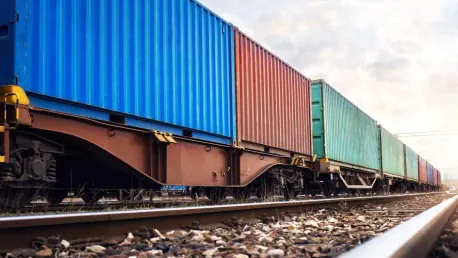Türkiye has taken a monumental step towards revolutionizing its railway system by launching its first privately-operated international freight train, signifying a major shift in the country’s transportation landscape. This move marks the initial stage in the Turkish government’s ambitious plan to transform its rail network into a key logistics hub that bridges Europe and Asia.
Pacific Eurasia’s Role in Freight Transport
Pacific Eurasia, a private Turkish company, plays a critical role in this landmark initiative. The company is set to operate 600 trains annually, moving 750,000 tons of export goods. To put this into perspective, the volume of freight handled by these trains is equivalent to the capacity of 22,000 trucks, showcasing the efficiency and substantial scale of this rail endeavor. The involvement of Pacific Eurasia in the rail sector underscores the increased participation of the private sector, previously dominated by state-run entities.
Expansion of Türkiye’s Rail Network
Over the past two decades, the Turkish government has demonstrated a firm commitment to railway development. Since 2003, Türkiye has expanded its rail infrastructure by nearly 3,000 kilometers, aiming for continued growth. The ambitious goals include reaching 17,287 kilometers of rail by 2028 and expanding further to 28,590 kilometers by 2053. This extensive rail network is expected to bolster the country’s logistics capabilities, strengthening connections between Europe and Asia.
Inaugural Journey to Budapest
Symbolizing this expansion and connectivity vision, the international freight train’s inaugural journey from Istanbul to Budapest spans 1,549 kilometers, passing through Türkiye, Bulgaria, Romania, and Hungary. This milestone sets a precedent for private-sector involvement in a field previously monopolized by the state. The shift indicates a more competitive and attractive environment for investment in Türkiye’s railway sector.
Strategic Goals and Economic Vision
Türkiye’s rail sector reform aligns with its broader economic and strategic goals. The country envisions its railway infrastructure as pivotal to its economic future, facilitating trade and enhancing its role as a transit link between continents. Strategic routes like the Baku-Tbilisi-Kars Railway (BTK), connecting to Central Asia and China, exemplify this vision. Minister Abdulkadir Uraloğlu highlighted the strategic importance of railways as the shortest, safest, and most cost-effective corridor between Asia and Europe.
Long-Term Development and Upgrades
Turkey has embarked on a groundbreaking journey to revolutionize its railway infrastructure by launching its first privately-operated international freight train. This significant development represents a pivotal change in the country’s transportation sector. The introduction of this train marks the beginning of the Turkish government’s extensive initiative to transform its rail network into a vital logistics hub, connecting Europe and Asia. This ambitious plan aims to enhance the efficiency and capacity of Turkey’s railway system, making it a central player in the global logistics landscape. By prioritizing the modernization and expansion of its railways, Turkey is positioning itself as a crucial link between two continents, potentially boosting economic growth and increasing trade opportunities. The move to allow private operators in the railway sector is expected to bring about increased competition, efficiency, and innovation. Ultimately, these efforts will not only strengthen Turkey’s domestic transportation capabilities but also reinforce its strategic importance on the international stage.









